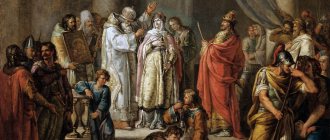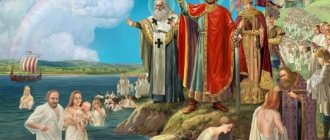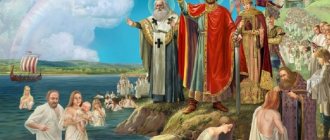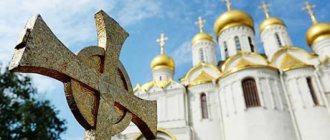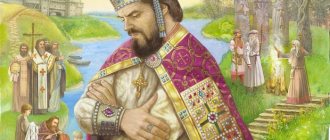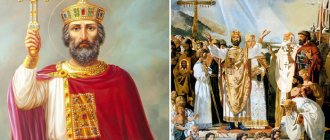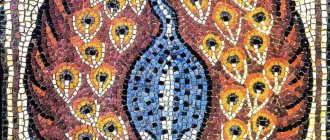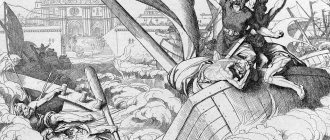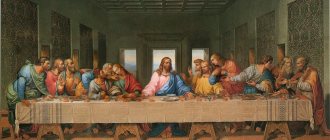The adoption of Christianity in Rus' contributed to the flourishing of the Russian state and subsequently determined the direction of its development. In the 10th century, objective reasons preceded the adoption of Christianity in Rus' and the state, torn apart by the internecine strife of numerous external enemies, was primarily interested in this. There was a need to unite the people in order to resist pagan polytheism, which required a unified ideology. At that time, Christianity was in all European states, and Rus' risked remaining in their eyes a “barbaric” country with its paganism.
The adoption of Christianity strengthened the international prestige of Rus', contributed to the expansion and strengthening of relations with Byzantium, and the further development of ties with Western countries and the southern Slavic world.
Prerequisites for the adoption of Christianity in Kievan Rus
According to historical sources, the adoption of Christianity in Rus' had its prerequisites. Against the backdrop of social and political factors, the need to strengthen the young state with a single idea and become a world power has become urgent.
Prince Vladimir and his retinue, in the late 980s, decided to change their faith after lengthy negotiations with states of different religions.
When choosing a state religion, Vladimir conducted a “test of faith” when embassies from Muslims were sent to Kyiv. From the Judaized Khazars and from Byzantium, everyone convinced the prince to accept their faith. But Vladimir himself sent his embassies “to the Germans,” “to the Bulgarians,” “to the Greeks” to “test their services.”
The ambassadors were struck by the beauty of Orthodox worship, which influenced the choice of Prince Vladimir; he decided in favor of Christianity.
However, the adoption of Christianity in the Orthodox version from Constantinople is also associated with the need to preserve important ties established with Byzantium earlier. The authority of the Byzantine Empire was also of great importance; at that time it was at the zenith of its power, being the center of civilization among European states.
Who baptized Rus'
Kievan Rus became Orthodox during the reign of Prince Vladimir Svyatoslavich (Krasno Solnyshko). Initially, he was brought up in the pagan tradition, but in adulthood he realized the need for fundamental changes in society.
Vladimir Svyatoslavich went down in history as the Baptist of all lands of Kievan Rus, a man who made a significant contribution to the development and prosperity of Christianity. Among the reasons why he decided to change the state religion were political, internal and others.
Subsequently, the Orthodox Church declared Prince Vladimir a saint and officially canonized him. The Day of Remembrance of the Baptist of Kievan Rus is celebrated annually on July 28. This date also marks the holiday of the proclamation of Christianity on Russian soil.
Before introducing Orthodoxy in the state, Vladimir Svyatoslavich thought for a long time about the choice of faith. The new religion had to meet all the needs of the ruling circles and the population, and promote the unity of people. In addition to Christianity, the ruler of Rus' considered Catholicism, Islam, and Judaism. The adoption and implementation of the historic decision was preceded by meetings with representatives of each of the religious faiths. According to legend, it was the Christian who interested the prince. He turned out to be a philosopher and told the ruler about the upcoming trial of human souls, showing him impressive pictures of the future biblical event.
Reasons for accepting Christianity
The main events that took place in Byzantium contributed to the adoption of Christianity in Rus'. The Byzantine Empire was going through difficult times in the late 90s of the 10th century. Emperor Vasily II needed help to suppress the rebellion, and he decided to turn to the Kyiv prince Vladimir. To which the prince agreed, but on condition of marriage with the emperor’s sister, Princess Anna.
A mandatory condition on the part of the emperor was the prince's acceptance of Christianity. In 988, Prince Vladimir and his retinue were baptized in Chersonesos, and only after that the wedding with Princess Anna took place.
Vladimir, having returned to Kyiv, turned to the people of Kiev with an offer to be baptized. This happened in 988, so this year of baptism is celebrated as the adoption of Christianity in Rus'.
There are other reasons that contribute to the adoption of Christianity. These include:
- the urgent need for the formation of a unified ideology in the state, which would spiritually unite the diverse peoples of Rus';
- strengthening ties with the peoples of Western countries;
- achieving a stable position for Rus';
- strengthening the power of Prince Vladimir;
- becoming an ally of Byzantium.
The choice of the Kyiv prince Vladimir fell on Christianity because there were contradictions in Islam to the established way of life, such as the ban on drinking wine, pork, as well as specific Eastern rituals (circumcision, horse slaughter).
Since Prince Vladimir set himself the goal of strengthening his power, he had no sympathy for Catholicism. Indeed, in Byzantium, the Orthodox Church in those years was politically helpless and completely subordinate to the emperors.
Even more prohibitions appeared in Judaism.
The Christian religion called for tolerance and forgiveness, it did not require sacrifices, did not divide peoples by nationality, and therefore the Russian prince chose Orthodoxy.
The problem of choosing faith
Neighboring states sought to draw Kievan Rus into the sphere of their own interests:
- Already in the 9th century, Byzantine and Roman missionaries appeared in Rus', actively preaching Christianity.
- In 985, Vladimir made a successful military campaign against the Volga Bulgarians. After establishing treaty relations, Bulgarian ambassadors tried to convert the Russian prince to Islam.
- The chronicles contain information about the Khazars' attempts to convert Vladimir to Judaism.
According to legend, Vladimir did not like the refusal of alcohol in Islam: “In Rus' there is joy in drinking.”
The meaning of the baptism of Kievan Rus
It took several centuries to strengthen the Christian faith, but paganism did not weaken its influence, which contributed to the emergence of dual faith. People prayed in church and continued to celebrate pagan holidays. So Christmas merged with the holiday of Kolyada, and Lent with Maslenitsa.
Having received the lands, the Church organized its own farms and mainly monasteries, they were headed by abbots. In the monasteries certain rules were observed: departure from everything earthly, vow of celibacy.
The baptism of Kievan Rus was very important for strengthening the institutions of state power and for the social life of the ancient Russian people, this was expressed in the following:
- The Church, having strengthened its economic relations, began to take part in political life; it advocated the unity of Rus' and fought civil strife;
- Schools began to be created at churches. The beginning was laid for the rapid development of church art: icon painting, compilation of chronicles;
- The princes entrusted the churches with legal proceedings, family and religious affairs;
- The Church contributed to the spread of literacy and the development of Orthodox culture, recognizing the pagan holidays of fun Kolyada and Maslenitsa as demonic.
Reason 4: Vladimir’s spiritual quest
Next there was a meeting between the prince and the Byzantine. A philosopher (as he was called by the chronicler for his demonstrated wisdom) from Greece told him about the faith of Christians and about the Bible. The most successful was the meeting with the Greek guest.
Among other reasons why Vladimir chose Orthodoxy, he was driven by the desire to know the truth. He was often guided by conscience and honor in his actions, in making decisions and in governing. Therefore, when choosing a religion, he was based on his own principles, similar to those described in the Bible.
Nevertheless, Prince Vladimir did not immediately choose Orthodoxy. After meetings with those close to him, he decided to attend the services of Muslims, Jews, Germans and Greeks. The prince's envoys, having visited Constantinople, expressed their delight: “They did not know where we were - in heaven or on earth.” As a result, Vladimir chose Christianity.
Historical significance of the adoption of Christianity
The adoption of Christianity has its historical significance, namely:
- The Christian religion strengthened the power of the state and contributed to the unity of the territories of Kievan Rus. The sovereign (“God’s servant”) became a fair judge in internal affairs of state, and in external affairs he acted as a valiant defender of the borders of his state;
- The status of Rus' in the sphere of international relations has changed. The Kiev state has become a civilized entity, observing generally accepted norms and rules of conduct;
- there was a flourishing of Kievan Rus and the spread of a new culture, this was expressed in the construction of churches and the development of writing. Educated Bulgarians who fled to Kievan Rus after the conquest of their country by Byzantium passed on their knowledge. The Old Church Slavonic language became revered by everyone and in religious literature too. The combination of this language and East Slavic gave rise to the development of the Old Russian language; chronicles and literary works were later written in it. Schools were opened in monasteries. Monks became doctors and teachers;
- a softening of morals occurred; if earlier robbery and murder were considered signs of valor, then after the adoption of Orthodoxy they were considered the greatest sin;
- since Christianity was adopted in Rus' in the Byzantine version (later called “Orthodoxy”), it helped a person to be spiritually transformed, which had a great influence on the development of social consciousness (mentality) of ancient Russian society;
- An Orthodox worldview appeared, expressed in the desire to understand the meaning of life in internal spiritual unity, and not in worldly wealth. The traditions of the Russian people received their approval in Christianity (attention to the sick, the poor and the wretched, in helping people in trouble).
The choice of the state religion of Byzantine Orthodoxy by Kievan Rus entirely determined the further development of Russian civilization. Economic, political and cultural customs similar to Byzantine ones gradually formed in the country.
However, Rus' did not become a passive addition to Byzantine culture. Having acquired the Byzantine inheritance, she herself had a great influence on the political world order.
The baptism of Kievan Rus has great civilizational significance. Philologist V.N. Toporov expressed his assessment of the significance of the adoption of Christianity for Russian civilization as follows:
These two events - the adoption of Christianity by Russia and Lithuania, which played an exceptional role in the history of these countries and predetermined their place in history for many centuries, should also be regarded as events of a universal nature.
Consequences for the Russian state
To summarize, we can say that the adoption of Christianity allowed Kievan Rus to receive many advantages. Being united by a single religion, the Russian people became more united and managed to increase the level of their spirituality. Many people joined the sciences, gained previously inaccessible knowledge, and abandoned an outdated worldview. The concept of Christian morality and purity of soul appeared in society.
It is important that the spread of Orthodoxy made it possible to eradicate the cruel rituals of the pagans and stop bloody sacrifices, including human ones. Instead of polygamy, the tradition of creating a family with one partner appeared.
Christian Rus''s prestige in the international arena has increased significantly. The state began to pursue a forward-looking foreign policy. To strengthen relations with other countries, Russian princes began to give their daughters in marriage to foreign kings. During pagan times, this was not possible, since when concluding dynastic marriages, religion was given paramount importance.
Baptism ceremony
By the will of Prince Vladimir, on July 28, 988, the population of Kyiv was gathered on the banks of the Dnieper for baptism in its waters. Who baptized Kievan Rus? The ceremony was carried out by Byzantine priests, specially invited for this purpose. Now this date is celebrated as the official holiday of the baptism of Rus'.
Vladimir began baptism with his sons and his close associates. Then he ordered all the idols to be destroyed, and Perun (the main idol) to be thrown into the Dnieper.
On a certain day, Kyivans were baptized en masse in the Pochayna River, at the place where it flowed into the Dnieper.
From this date, the spread of Christianity began, which lasted for several centuries. The reason for this was paganism; it remained very strong in many principalities. Many divisions had to be overcome before the Orthodox faith was fully established as the official religion.
So in 1024 in the Vladimir-Suzdal principality there was a rebellion of supporters of the old faith, and in 1071 the uprising in Novgorod was suppressed. Rostov adopted Christianity only towards the end of the 11th century, and Murom even later, closer to the 12th century.
Basic Prerequisites
During the reign of Princess Olga and Prince Svyatoslav, paganism flourished in Rus'. It was associated with the existence of tribal relations. Many neighboring tribes had approximately the same beliefs, which brought them closer to each other. The Christian faith was accepted in states with a strengthened feudal system.
The nature of tribal relations was a limiting factor for the spread of Christianity. This was the problem, why such an event could not happen here quickly. At the same time, it covered some noble segments of the population. In particular, Princess Olga was baptized at one time .
The most developed states with which Kievan Rus was in close contact included Khazaria and Byzantium. They were not pagan countries; the process of Christianization was already observed in them. The princes of Serbia and Poland followed this path.
In order to keep up with progressive states and continue cooperation with them, it was necessary to make a decision regarding a change of faith. This was the prerequisite for the baptism of Rus' and why Prince Vladimir took such a step.
Cultural and political implications
Rus' accepted Baptism before the schism of the Eastern and Western Churches occurred (in 1054), but it was already in the ripening stage and was expressed both in doctrine and in relation to the church and secular power.
In Byzantium, church and state legal consciousness meant the emperor as the guardian and supreme defender of the Church (epistimonarch). Thus, he was considered the sole autocrat (autocrator) of the entire Orthodox people. He gave the titles of princes, archons, and stolniks to the rulers of other Christian states.
Consequently, Vladimir, after Kievan Rus adopted the Christian faith from the Byzantines, automatically introduced his country into the structure of the Byzantine state.
In the 12th century, the great prince of Kyiv in Constantinople was given the title of steward by the Byzantine emperor. The place of the Kyiv Metropolis in the diptychs of Constantinople was one of the last, initially - 61st, in subsequent years (1306-1328) - 77th place.
The adoption of Christianity also had cultural consequences, this was expressed in the development (in the forms of the Middle Ages) of architecture and painting, the penetration of Byzantine culture, which is the heir to ancient traditions.
Particularly important was the development of Cyrillic writing and the appearance of books. Actually, the baptism of Rus' contributed to the appearance of the first monuments of ancient Russian writing.
Choices
Although the division of the branches of Christianity occurred only in 1054, already in those days it was possible to describe the differences between Orthodoxy and Catholicism. Both faiths had their pros and cons, which are presented in the table.
| Divergence | Orthodoxy | Catholicism |
| Rituals | Communion was carried out with bread and wine | Only the clergy could receive communion with wine, and everyone else did it in circles made of dough, which were called wafers. |
| Language | Any | Latin |
| Relations between church and state | There was a subordination of the clergy to state power | The head of the clergy and the entire political world was the Pope. |
Conclusion
Converting to Christianity was not an overnight process. It was a long and laborious process of transforming the state. Because power and religion in those days were indivisible concepts, then the adoption of a new faith completely changed the country. It is with the adoption of Christianity that the countdown of a new era begins. After the introduction of a new religion, Rus' gradually turned into a powerful power that had significant weight in the political arena. History shows that the choice made by Prince Vladimir was very favorable from the point of view of the further development of the state.
Sources used:
- https://fox-calculator.ru/slavane/prichinyi-prinyatiya-hristianstva-na-rusi-tablitsyi-i-shemyi/
- https://10prichin.ru/istoriya/10-prichin-kreshheniya-rusi
- https://history.wikireading.ru/305333
- https://plusiminusi.ru/prichiny-i-posledstviya-prinyatiya-xristianstva-na-rusi/
Choosing your faith
The problem of “choosing faith” is also important, on the solution of which the entire course of development of Russian history depended.
Under the year 983, at the beginning of the reign of Vladimir, the chronicler places a story about the following event. Vladimir, after a campaign against the Yatvingians, returned to Kyiv and sacrificed to idols along with his people; the elders and boyars said: “Let us cast lots for the youths and maidens; Whoever it falls on, we will sacrifice him to the gods.” At this time, a Varangian lived in Kyiv, who came from Greece and professed the Christian faith. He had a son, beautiful in face and soul; The lot fell on this young Varangian. People sent from the people came to the old Varangian and told him: “The lot fell on your son, the gods are pleased to take him for themselves, and we want to sacrifice him to them.” The Varangian replied: “You have no gods, but you have a tree; today it exists, and tomorrow it will rot, not eating, not drinking, not speaking, but made by human hands from wood; and one God, whom the Greeks serve and worship, who created heaven and earth, the stars and the moon, and the sun, and man, gave him to live on earth; and what did these gods do? I will not give my son to the demons!” The envoys conveyed these speeches to the people. The crowd took weapons, went to the Varangian house and broke the fence around it; The Varangian stood in the hall with his son. People shouted to him: “Give your son to the gods.” He replied: “If these are gods, then let them send one god to take my son, and what are you worried about?” A furious cry was the response of the crowd, which rushed at the Varangians, cut down the canopy under them and killed them. Despite the fact that the brave Varangian fell victim to triumphant paganism, this event could not fail to make a strong impression. Paganism, the idols, were solemnly challenged, they were solemnly cursed; the sermon was preached loudly; people in the heat of rage killed the preacher, but the rage passed, and the terrible words remained: “your gods are a tree; there is only one God, whom the Greeks worship, who created everything,” and the Vladimir idols were unresponsive to these words, and what could the Slavic religion say in its favor, that it could respond to the high demands placed on it by preachers of other religions? The most important of them were questions about the beginning of the world and the future life. That the question of the future life had a strong influence on the pagan Slavs, as well as on other peoples, is evident from the legend of how the Bulgarian king converted to Christianity as a result of the impression made on him by the picture of the Last Judgment. According to Russian legend, the Greek preacher used the same remedy here and also made a strong impression on Vladimir; After a conversation with him, Vladimir, according to legend, convenes the boyars and city elders and tells them that preachers from different nations came, each praising their faith. Finally the Greeks came, they blaspheme all other laws, they praise you, they talk about the beginning of the world, about its existence, they speak slyly, they listen to them with pleasure and in a different light they say: if anyone comes into their faith, the dead will rise again and will not die forever after, if another the law comes into force, then in the next world it will burn in fire.
So representatives of three religions came to Vladimir in Kyiv: Islam, Judaism and Christianity. The prince rejected Islam on the pretext that it prohibits the consumption of wine. “The joy of Russia is to drink, without drinking there will be no Russia,” he allegedly responded to the temptations of Muslims. He did not accept Judaism because the Jews did not have their own state, as a result of which they were scattered throughout the earth. He did not accept the offer made by the pope's envoys, citing the fact that his grandmother also rejected Catholicism. Only the sermon of the representative of the Orthodox Byzantine Church made a favorable impression on him. But Vladimir was in no hurry to make a decision and sent his ambassadors to different countries. When they returned, they called the Greek faith the best, and the Greek temples and church services the most beautiful.
Behind all this are hidden the real facts that stopped Rus' from choosing the Orthodox form of Christianity.
These are, first of all, strong cultural and economic ties with Byzantium, the presence of its own influential Orthodox community. In addition, the international situation, relations between the church and the state, as well as some features of various religions were taken into account. Thus, the pope’s claims to secular power, the reluctance of the Catholic Church to take into account local peculiarities and its belligerence could not but alienate the head of the young state from this form of Christianity. The Orthodox Church was subordinate to secular authorities. This was in accordance with the East Slavic tradition, according to which the prince was also the head of a religious cult. Orthodoxy was more tolerant of local traditions, and Byzantium at that time seemed to be the center of civilization, the heir of the great Rome, the most developed and cultural country in Europe.
Baptism of Vladimir and his squad
Regarding the circumstances and time of the baptism of Prince. Vladimir in ancient Russian sources there is no unity. According to the “Korsun Legend”, a legend that dates back to the turn of the 11th–12th centuries. entered into the ancient Russian chronicles, and then into the Life of St. Vladimir, the prince was baptized in the city of Korsun, the center of Byzantine possessions in Crimea, which he captured, in 988 (however, the actual capture of Korsun most likely occurred in 989); Vladimir’s marriage took place there with the sister of the Byzantine emperors Vasily II the Bulgarian Slayer and Constantine VIII Anna. There is another tradition, also recorded already in the 11th century, which dates the baptism of Vladimir to Kyiv and to the time two years before the capture of Korsun.
The baptism of Russian cities and the establishment of a church organization in Rus'
The baptism of the prince and his squad was followed by a mass baptism of residents of the largest cities, organized by the state authorities, primarily Kyiv and Novgorod. In the first years after baptism (no later than 997), a metropolitanate was established in the Old Russian state with its center in Kyiv, subordinate to the Patriarchate of Constantinople. At the same time as the metropolis, at least three dioceses were established in it: in Novgorod, in Belgorod of Kiev, and also, probably, in Polotsk and/or Chernigov. The first bishops were Greeks. In accordance with church tradition (established no earlier than the 16th century), the first Metropolitan of Kyiv is considered to be St. Michael, however, Byzantine sources give reason to assume that the first metropolitan was Theophylact, transferred to Rus' from the Sebastian metropolis (northeast Asia Minor).
Since the 990s Wooden temple construction is unfolding in Rus'. According to the “Praise to Prince Vladimir” (1040s), written by the future Metropolitan Hilarion, the first monasteries arose under Vladimir. In 995–996 In Kyiv, the first stone Church of the Tithes was consecrated, which probably served as the princely palace cathedral. Old Russian sources associate the consecration of this church with measures taken by the state authorities to provide material support for the church organization: a tenth of the total princely income was to be allocated for its needs - the tithe, which was collected at the Temple of the Tithes. The consequence of the baptism of Rus' in the legislative field was the division, according to the Byzantine model, of princely and church (metropolitan, episcopal) jurisdictions, which is ancient Russian. tradition also dates back to the reign. Vladimir Svyatoslavich. The sphere of church law included marriage and family relations, crimes against morality, trials of clergy and members of their families, etc. All these regulations were reflected in the princely statutes of the 10th-12th centuries. The most important task was to provide cathedral and parish churches with Russian clergy (for which the children of the nobility were forcibly selected “for book training”), as well as with liturgical books.
Spread of the Christian Faith
Immediately after the baptism, Vladimir orders the construction of churches and placing them in the places where the idols previously stood. Thus, the Church of St. Basil was built on a hill where the idol of Perun and other gods stood. Vladimir ordered the founding of churches and the appointment of priests in them also in other cities and the bringing of people to baptism in all cities and villages.
There is news that the Metropolitan and bishops sent from Constantinople, with Dobrynya, Uncle Vladimir and priest Anastasius, went north and baptized the people. Naturally, they first went along the great waterway, up the Dnieper, dragging and catching, to the northern end of this path - Novgorod the Great. Many people were baptized here and a church was built for new Christians. But from the very beginning, Christianity was not widespread among all residents. From Novgorod, most likely by water, the preachers went east to Rostov. This ended the work of the first Metropolitan Michael in 990. In 991 he died, and a new Metropolitan Lev was summoned from Tsar-Grad. With the help of Bishop Joachim Korsunyan, sent to Novgorod by Metropolitan Leo, paganism was finally suppressed here.
Thus, Christianity under Vladimir spread mainly along a narrow strip adjacent to the great waterway from Novgorod to Kyiv; East of the Dnieper, along the Oka and Upper Volga, even in Rostov itself, despite the fact that the preaching reached these places, Christianity spread very little. Subsequently, the monks of the Pechersk Monastery will be preachers of Christianity among the Vyatichi and Mary and will be martyrs there; the chronicler directly says that at one time the Vyatichi still preserved pagan customs. Finally, Hilarion, a contemporary of Vladimir’s son, calls Russian Christians the small flock of Christ. The prince himself is responsible for the spread of Christianity west of the Dnieper, in those countries that he had to visit because of his connections with Poland; there is news that in 992 he went with bishops to the southwest, taught, baptized people, and in the land of Chervenskaya built the city of Vladimir and the wooden Church of the Virgin Mary in his name.
The Metropolitan and the bishops sent a castle from the king. In Kyiv, if there used to be Christians and a church, then there were, of course, priests. Vladimir also brought priests from Chersonesus. But all this quantity was not enough to baptize and teach people in Kyiv and other places.
And now there is news that priests were sent from Bulgaria who could teach the people in a language they understood. But no matter how many Greek and Bulgarian priests came, they were not enough for the real need. It was necessary to increase the number of their Russian priests, which could not happen otherwise than through the dissemination of book teaching. Such dissemination was undertaken immediately after the popular baptism in Kyiv, for the metropolitan and the prince saw in it the only means of establishing the faith. Fathers and mothers were not approved, so Vladimir ordered the children to be taken from the best townspeople and placed in a book of teachings. Children were sent to study in church with priests and clergy.
